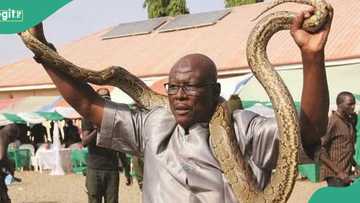Right to Life in Jeopardy in Nigeria Amid Femicide Epidemic
- For too long, vulnerable victims in Nigeria have suffered the consequences of systematic machismo, discrimination, inequality, lack of guidance and, above all, government inaction
- Amid social stressors including the worst economic crisis in a generation, peer pressure, parenting challenges, and social expectations, the most populous black nation on earth has seen an alarming rise in the number of femicides over the last year
- In this special report, Legit.ng takes a deep examination into the violation of human rights associated with femicide, documenting cases, and spotlighting ways to curtail the phenomenon
Legit.ng journalist, Ridwan Adeola Yusuf, has over 5 years of experience covering human rights issues and women's matters.
Warning: This report may contain strong language as well as graphic images which may be disturbing to some people. Reader discretion is advised.
Uke, Nasarawa state - On the 11th day of the new year 2025, beautiful Adaidu Eleojo Salome set out to see her boyfriend, Maxwell Ajah. Excited to meet up with the love of her life, Salome made sure she dressed to the nines.

Read also
2baba’s new boo: Natasha Osawaru’s aunt weighs in amid Annie Idibia’s grand return, lawamker’s drama
As she lived with her family, the 24-year-old National Youth Service Corps (NYSC) member was expected to return home the following morning, Sunday, January 12. But sadly, the previous day’s trip turned out to be a journey of no return.
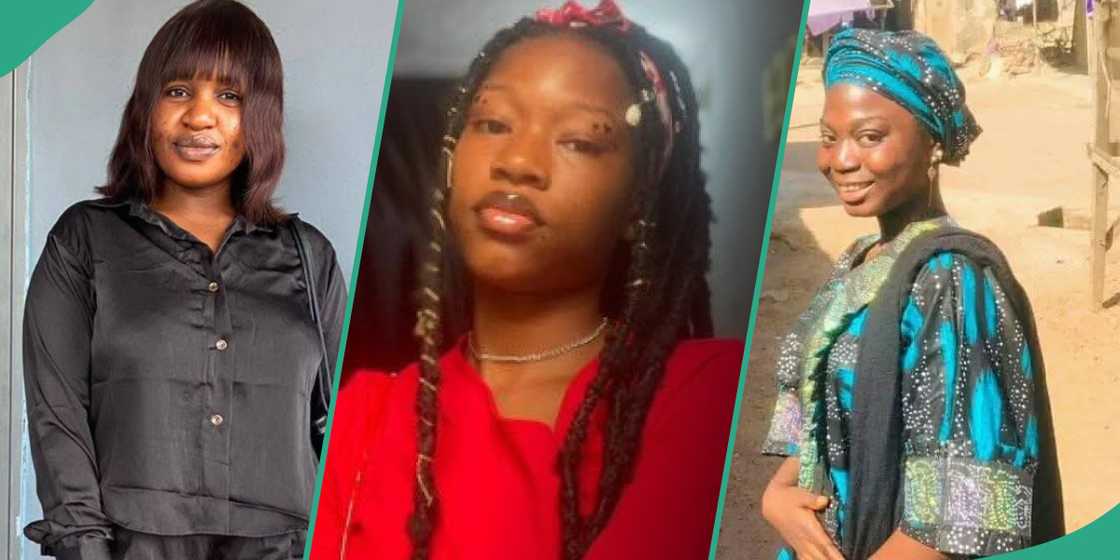
Source: Twitter
“I stayed till 4 pm, I didn’t see Ele (referring to Eleojo). We tried Ele's number, but it did not go through. A call then came with Ele’s line informing us to come and meet them at Uke General Hospital in Nasarawa state,” Patience Adaidu, Salome’s sister, recounted on Brekete Family, a popular Abuja-based human rights broadcast platform.
At a section of the medical centre, the most horrific sight ever—the badly mutilated naked body of Salome—greeted her loved ones.
Amid strong national attention on the apparent murder case, an arrested resident, Timileyin Ajayi, confessed in multiple interviews to killing and subsequently dismembering Salome’s body.
“He (Ajayi) cut that body into more than 50 pieces,” slain Salome’s uncle, Adaji Samson, said with grief. “When you look at the whole thing, he is preparing that body for consumption because he cut the body and put it in about six polythene bags. If you look at where people contribute money to buy cattle during the festive period and those times the Fulanis would come to share the cow among the people that contributed for it, that is exactly what he did in his room.”
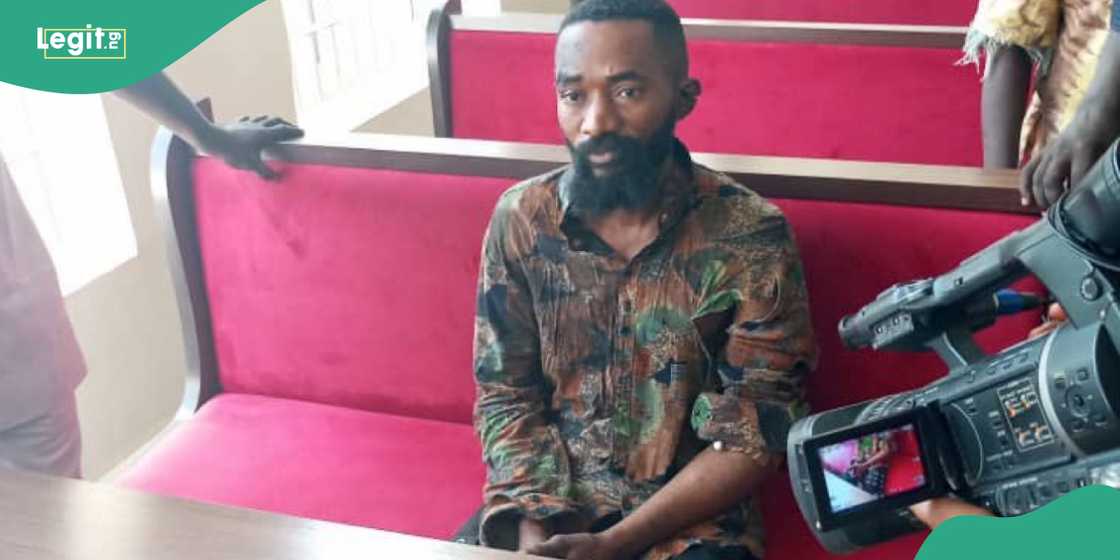
Source: Twitter
Although how Salome ended up in Ajayi’s room remains a mystery, the deceased family have insisted that she was kidnapped and that the suspect belongs to a human parts trafficking ring.
A report released in November 2024 by the United Nations Women and the UN Office on Drugs and Crime (UNODC) revealed that in 2023, 140 women died daily in alleged femicide.
This means that one woman is killed every 10 minutes.
Femicide, the intentional killing of a girl or woman, in particular by a man and on account of her gender, is a pressing social and human rights issue in Nigeria and globally. It is one of the violence against the female gender that is under-reported.
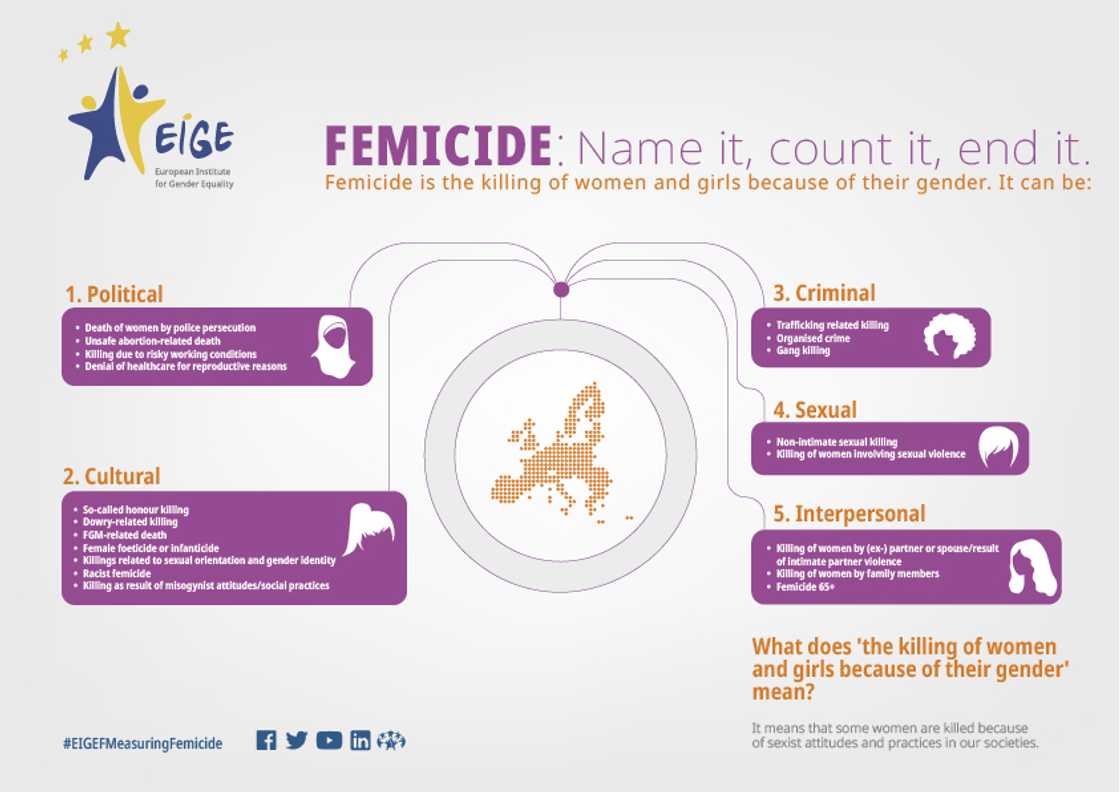
Source: Twitter
In most incidents of gender-based killings in Nigeria, females are at the receiving end. Women often find themselves in situations of vulnerability, thus, they are being targeted by murderous men.

Read also
Edo massacre: Governors take one action against possible revenge as 16 slain hunters get buried
Africa and Nigeria are significantly affected. Per a Lagos-based rights group, DOHS Care for Vulnerable Women and Children Foundation, in November 2024, over 100 Nigerian ladies were murdered in 10 months.
Suspected ritualist kills female student
Murder is not just taking a life illegally; it is a theft of dreams, silencing of laughter, and the ruination of a future.
Salome’s incident was still fresh in the minds of Nigerians when another case came up. In Ilorin, Hafsoh Yetunde Lawal, a 24-year-old final-year student of the Kwara State College of Education Ilorin, was gruesomely murdered in February 2025 by a man she reportedly met on the popular social networking site, Facebook. After allegedly killing her, the suspect went further to dismember the lady's body for suspected money ritual purposes.
Following investigations by the Nigeria Police Force (NPF), Abdulrahman Bello, 29, was apprehended.
Bello was alleged to have invited the lady through a phone call and committed the heinous crime at a location in Offa Garaji in Ilorin, the Kwara capital.
Ejire-Adeyemi Adetoun, the police spokesperson in Kwara, while confirming the incident, said security agents traced the victim’s phone numbers after she was reported missing on Tuesday, February 11.
Adetoun disclosed:
“On 11/02/2025 at about 1800 hours, a case of a missing person was reported at C Division Oja-Oba by her father, Mr. Ibrahim A. Lawal.
“Immediately, the police detectives swung into action, tracked her phone numbers to the suspect’s house in the Offa Garaji area in Ilorin, arrested Bello, and recovered exhibits.
“Upon further investigation, police discovered Yetunde’s dismembered body, hidden in a bowl, along with equipment used for the act.”
Undergraduate murdered by university student abductor
In a tragic turn of events, a 300-level student from the Federal University of Agriculture, Abeokuta (FUNAAB), Ogun state, Idowu Christianah, who was kidnapped in Lagos, was killed by her abductor, Ayomide Adeleye.
Christianah, 21, left her home in Itaoluwo area of Ikorodu for the University of Lagos (UNILAG) in Yaba, where she was undergoing her industrial training when she was tricked in by her friend, Adeleye.
Adeleye, a 200-level Philosophy student of the Olabisi Onabanjo University (OOU), Ogun state, owned up to the crime. His confession, made to the 174 Battalion of the Nigerian Army, brought an end to the weekslong search for the girl who went missing on Sunday, August 18, 2024.
Troops tracked Idowu’s phone to Adeleye’s parent’s residence in Ikorodu.
The 23-year-old denied knowledge of the lady's abduction and claimed to be in possession of her phone because he was a phone repairer. He said unknown persons gave him the phone to repair and he asked no questions. However, less than 24 hours later, he confessed to killing her the same day she went missing.
The motive for the mindless killing? Adeleye was financially constrained and badly needed money, thus, evil spirits worked him up.
As an acquaintance and church member, Christianah did not sense foul play when Adeleye beckoned her to come over when she took cover for rain while heading to UNILAG.

Read also
DJ Cuppy ignites heated online debate over comment on Namibia's first female president & vice
What began as a young lady seeking shelter in a friend’s shop turned into a murder and then a staged abduction with a ransom demand.
An insider told the Foundation for Investigative Journalism (FIJ) in September 2024:
“On that Sunday, the girl who normally goes to UNILAG on weekends to return home on Friday left her house as usual. While on her way, it began to rain, so she took cover in Ayomide (Adeleye’s) family’s shop which was just outside his house.
“The boy narrated everything in custody. She (Christianah) only wanted to stay out there for a while and head back to her destination, but he invited her into his house when the rainfall became intense.”
While in his house, Adeleye killed her.
“I killed her because I had financial problems,” Vanguard newspaper quoted Adeleye as saying. “I thought of the problems and decided to strangle her while she was busy going through my phone. I then called her mother claiming that she was kidnapped and she should pay ransom. She was preoccupied with my own phone. Then, it was drizzling, and a little noisy, so, I just grabbed her.”

Read also
Annie Idibia makes social media return after 2baba separation, takes major action: "New beginnings"
After burying her in a makeshift shallow grave, he contacted the slain lady’s mother and demanded a ransom.
Using his victim’s phone, Adeleye texted Christianah's mother via WhatsApp.
His text message read:
“Hello Madam, you have such a beautiful daughter. How much are you willing to pay to see her again? We have her in our custody.”
From a N3 million (about $1980) initial demand, the suspect agreed that N350,000 ($231) should be sent to a betting account, which the family paid. That would be his undoing.
Intelligence operatives were able to discover the location of the prime suspect through the bank verification number (BVN) and account details used to collect ransom from the victim's family.
Investigators found that he withdrew N100,000 ($66) from the betting account before agents reportedly got the betting company to lock the account.
Armed with information, operatives started an investigation into the suspect whom they observed maintained a mutual relationship with Christiannah, especially judging by Instagram posts as they both commented on each other’s pages.

Read also
Man kills pregnant fiancée, 3-yr-old daughter after heated argument, location, other details emerge
Security operatives’ cell phone tracking led them to Adeleye’s parent’s house in Ikorodu and his eventual capture.
KillaBoi’s fatal attack on girlfriend
Benjamin Hundeyin, the spokesperson of the police in Lagos state, confirmed in October 2023, that efforts are on to extradite an Instagram influencer, Benjamin Nnanyereugo, popularly known as KillaBoi, who was arrested by Sierra Leonian authorities following complaints that he killed his late girlfriend, Augusta Osedion.
The suspect confessed on social media that he “mistakenly” stabbed his girlfriend in his Oral Estate home in the highbrow area of Lekki, Lagos, on July 13, 2023, after they got into an argument.
He wrote in one of his numerous posts on his Insta stories:
“I got into an argument with my girlfriend @austa xxo which fight I mistakenly stabbed her and ran away out of fear and been suicidal since then (sic). I intend to end my life now cause (sic) I have lost the one I cherish so much. I want to do the right thing and turn myself in. I will gladly die by paying with my life now.”
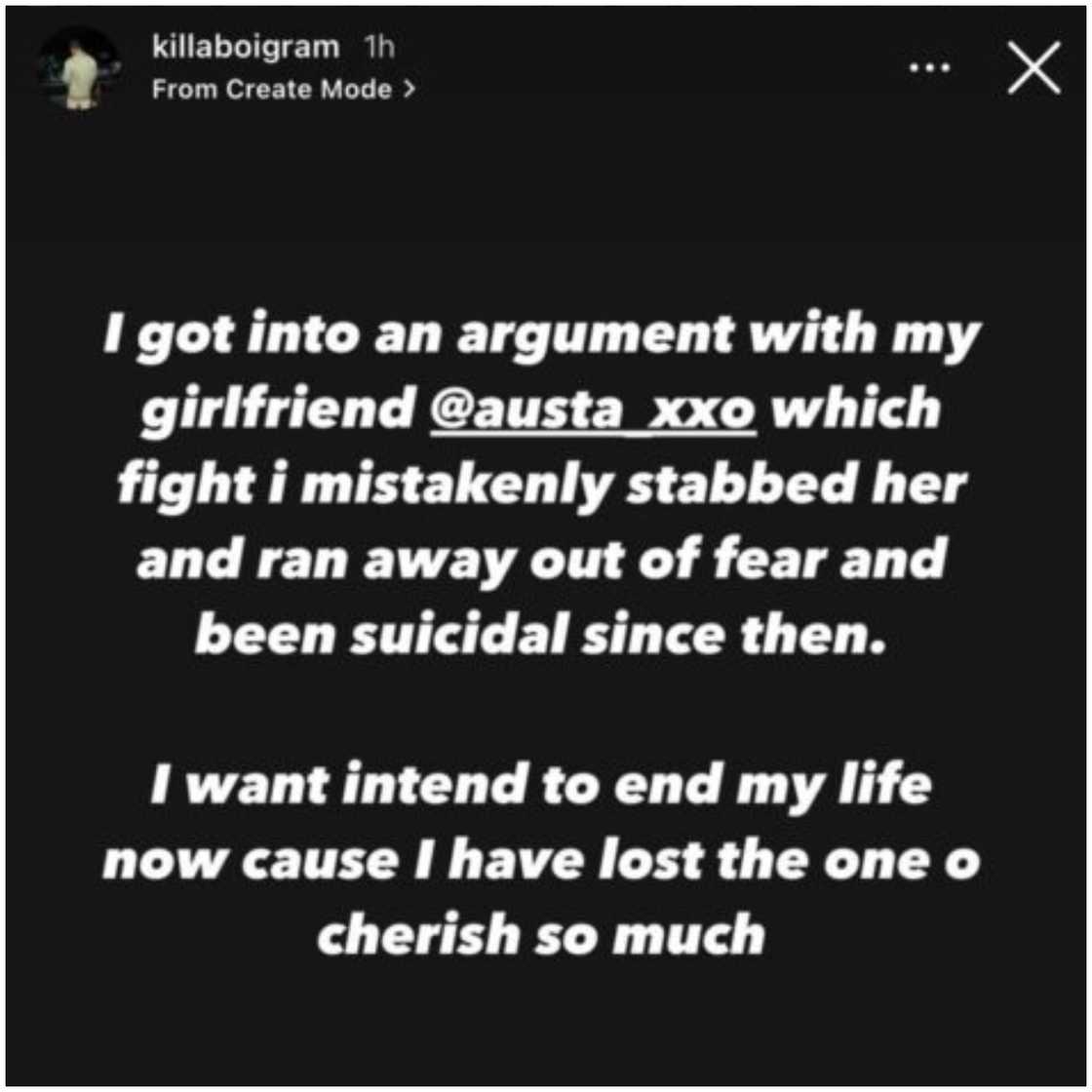
Source: Original
Strangely, a year and five months after ‘beginning his extradition’, the Nigerian police as well as the Sierra Leone Police continue to play dumb on the confessed killer.
20-year-old confessed killer influenced by ‘TikTok native doctor’
In September 2024, the Kogi state police command confirmed the arrest of a 100-level Biology student of the Federal University Lokoja, Jeremiah Paul, over the death of a female colleague, Olowoyo Abigail Damilola.
The suspect confessed to killing Damilola, 19.
In his confessional statement, the 20-year-old said:
“I approached Damilola and she accepted. We started chatting. I already had it in mind that I wanted to use Damilola for money ritual. So, on September 4, 2024, I bought codeine and Sprite and mixed it up and gave it to her.
“I first drank it so that she would not suspect it. When she drank it, I told her to let us go to my house and she agreed. When she felt weak, I took her to an uncompleted building close to my place and strangled her to death. The cloth she was wearing, I used it to tie her leg and neck. I later dragged her to a nearby bush and removed what the native doctor told me to remove.

Read also
Rivers state: Actress Hilda Dokubo reacts to President Tinubu’s state of emergency declaration
“The native doctor who resides in Ibadan sent a driver and brought a calabash and a knife. He used black and white cotton to wrap the calabash and a red cloth to wrap the knife. It is the knife I used to remove parts of her body, which are the eyes, tongue, lungs, intestine and some parts of her bottom. I put it inside the calabash and wrapped it. I now gave it to the driver who he sent from Ibadan to Lokoja.
"So, the driver waybilled it back to Ibadan. After that, he now waybilled my soap back to Lokoja.
"I met the native doctor on TikTok and I copied his number and later messaged him on WhatsApp. I went with my friend to Ibadan to see the native doctor.”
Hot-tempered Chinese lover kills local in Kano
Frank Geng-Quangrong, a Chinese national, was accused of fatally attacking his girlfriend, 22-year-old Ummukulsum Sani, in September 2022 at a Kano residence.

Read also
Ushie Rita Uguamaye: NYSC member who called Lagos a ‘smelling state’ tenders public apology
Geng-Quangrong was discovered in her room after having stabbed her several times there.
The killing of the young agriculture undergraduate shocked Nigerians and the case was closely followed.
Quarong, 49, and Ms Sani had been in a relationship since 2020 after having met in a shopping mall. He was in Nigeria working for a local textile firm.
Speaking shortly after the 2022 killing, family friend Ahmad Abdullahi described what had happened. He remembered coming to the family home and seeing that "a lot of people had gathered outside the house".
Abdullahi said: "That was when we knew something bad had happened. Geng was her boyfriend and had good relations with her family prior to that day. Before the incident, they were having issues as she was no longer interested and he didn't want to let go."
According to neighbours, on the night of the killing, Quarong was heard knocking heavily on the gate to the Sani family home.

Read also
“How dad of NYSC member who criticised Tinubu died after protesting govt’s demolition,” Jalingo shares
When Ms Sani's mother opened the gate, he pushed her aside and rushed straight to his lover's room, locking it from the inside.
Her shouts and cries attracted the family and before anyone could break down the door to help, she had been stabbed several times. She did not survive at the hospital.
Geng-Quangrong would be later sentenced to death by hanging by a Kano state high court in 2024.
Death sentences for capital offences are common in Nigeria. However, executions rarely occur as they require approvals by state governors. Only two warrants for death sentences have been signed since 1999, according to Inibehe Effiong, a prominent Nigerian human rights lawyer.
Nigeria currently has more than 3,400 people on death row and the last execution was carried out in 2012.
Man bathes wife with petrol, sets her ablaze in Anambra
Nwana Chioma, a 37-year-old mother of five, was set ablaze by her husband in January 2025.
The attack happened following a heated altercation over suspected infidelity at Eziezekwe village, Abagana, in Njikoka local government area (LGA) of Anambra state.
Chioma, who sustained severe burns, was rushed to a nearby hospital but succumbed to her injuries. The video of the attack left many Nigerians stunned.
Nnamdi Anieche, late Chioma’s younger brother told The Punch how her sister stayed on in abusive marriage despite life-threatening attacks.
He said:
“At the hospital, she explained that they had been having misunderstandings over the years. She said that on several occasions, her husband injured her with bottles and threatened to pour fuel on her and set her on fire, a threat he eventually carried out.
“She endured tremendous pain throughout the marriage.”
Following the condemnable act, the suspect presented himself at the Abagana divisional police station, confessed to the deed, and expressed deep regret.
Gender-based violence and femicide interventions

Read also
Senate spits fire after viral video of Natasha kissing her husband before entering the chambers
Bose Ironsi, the executive director of Women’s Rights and Health Project (WRAHP), frowned at domestic abuse.
“You say ‘for better or worse’. The ‘worse’, they didn’t say you should be the one to kill me,” the concerned activist told Legit.ng. “Why can’t two adults sit down and harmonise the way they want to live?”
Ironsi reasoned that parents should actively listen to their daughters' complaints about their marriage, as it is important to provide a supportive space for their adult children to share their concerns and feelings, especially when facing challenges within their marital relationship; this allows parents to offer guidance and emotional support without necessarily interfering in the couple's decision-making process.
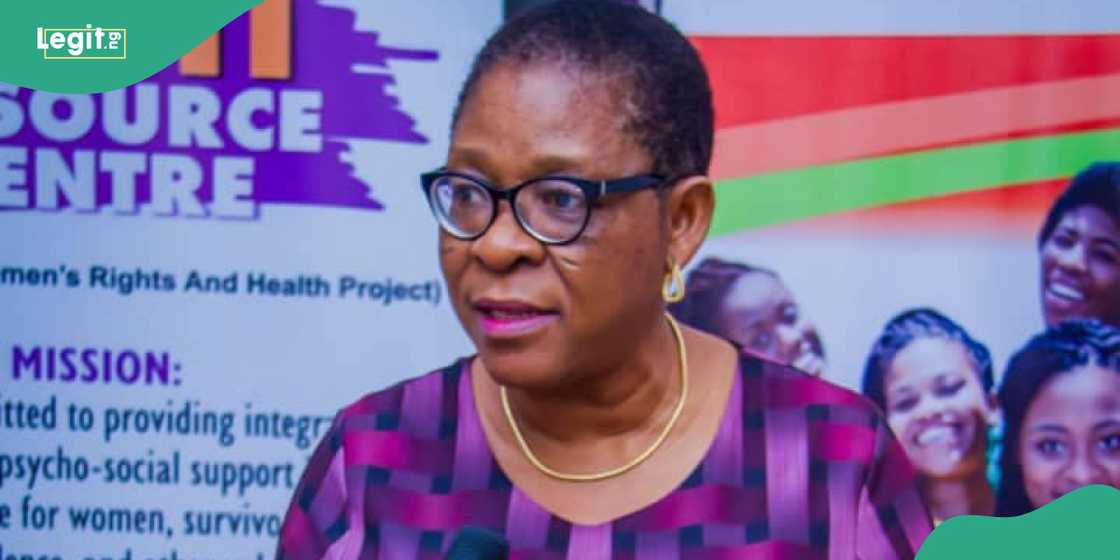
Source: Facebook
“There is a need for parents to listen to the voice of their daughters in marriages, because most times, this femicide happens with sexual partners," she explained. "When a daughter tells you about the physical abuse she is suffering in marriage, please don’t tell her to go to a war-torn zone without a gun. They (the parents) can even make such a man sign an undertaking that he will not lay his hand on the daughter anymore.”
She also counselled partners on anger management in relationships, recommending "dialogue" for would-be couples.
She said: “If you know you have anger management, there should be a psychotherapist that would talk to you. You should seek help. Don’t put the anger on your partner."
Social services play a crucial role in combating femicide, but in Nigeria, there is no well-defined structure for it. Most of the support provided to victims of abuse comes from non-governmental organisations (NGOs), which play a crucial role.
Oluwatomisin Adebukola Badewole, executive director of Hope for the Masses Foundation, advised that these organisations should not bear the entire responsibility for addressing such issues.
In most states, the ministry of women affairs and poverty alleviation handles cases related to abuse. Departments like the Women Affairs and Poverty Alleviation (WAPA) exist at the local government level in Lagos to provide assistance, while some states have established domestic violence agencies. These agencies play a significant role, yet the response time remains a major concern.
Lagos, as a pioneer in the fight against domestic violence, has passed laws and gathered extensive data on the issue. While the efforts made so far are commendable, Badewole noted that the slow response time often undermines the impact of these initiatives.
She recalled while speaking with Legit.ng:
“For example, a friend of mine personally visited the Domestic and Sexual Violence Agency (DSVA) multiple times to report cases of domestic violence—physical, emotional, and psychological. Each time, her complaint was documented, but follow-up was inconsistent. In one instance, when she reported a fresh case involving her husband, instead of immediate action, a mediation session was arranged between her and her husband. Shockingly, the official assigned to the case advised her to be patient and endure the situation.
“When I first heard this, I found it unbelievable, considering my experience working with the agency. I knew this was not standard practice. However, when the woman returned to report another incident, she was simply told that someone would contact her. Three days passed, and no one did. It was only after I personally called the Lagos State Emergency Response Service that meaningful action was taken. The case was eventually referred to WAPA, and after repeated follow-ups, some progress was made.”
Tasking Lagos’ DSVA on efficiency, Badewole stressed that response time must be improved as the lack of urgency from frontline workers is improper.
“These professionals require specialised training, and their recruitment and onboarding processes should ensure they are well-equipped for the job,” she said. “Continuous professional development is essential to keep them aligned with best practices in counselling, gender advocacy, and social work.”
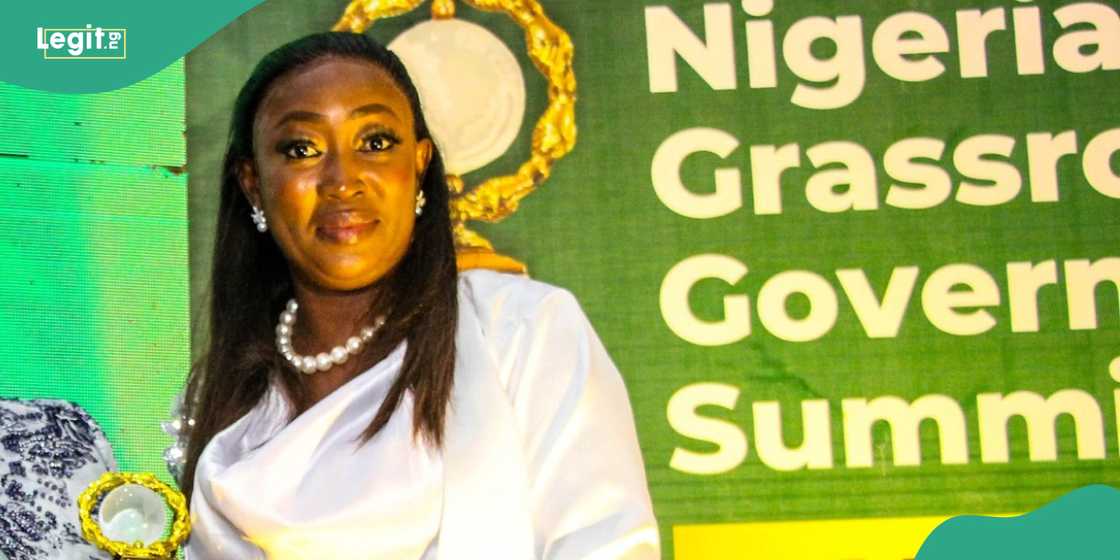
Source: Facebook
Beyond improving response time, there is a need for a well-structured social safety network, Badewole said, adding that both state and federal governments should establish systems that provide immediate relief and long-term support for victims.
“An empowered woman is a courageous woman,” she noted. “When women have access to basic necessities such as food and shelter, they are more likely to speak out against abuse rather than remain trapped in harmful situations.
“Abuse is not just a women's issue—it affects entire families, especially children who grow up in such environments. Establishing a strong social safety network would ensure that victims—whether abused by a spouse, parent, or other family members—can find a safe space where their needs are met while they rebuild their lives.”
Ironsi, who has been at the forefront of advancing women’s rights in Nigeria for over two decades, asked the Nigerian government to take a cue from Puerto Rico and declare a state of emergency over widespread femicide. The girlchild, youthful women, and young female adults have become endangered, Ironsi said with pain.
“I think we should declare a state of emergency on femicide, because last year (2024) alone, about 100 women were murdered in cold blood,” she bemoaned. “And between January and now, it has gone up. And we are just starting the year. So, you ask: ‘are women responsible for the hard times to be subjected to this kind of wickedness’? Therefore, I think that it (femicide) is long overdue for a state of emergency.”
Travails of youthful Nigerian women divorcées
Meanwhile, in another special report, Legit.ng analysed the disregard for human rights and how some youthful Nigerian women are being exploited in marriage.

Read also
Daddy Freeze reacts as PSquare's brother Jude Okoye is arraigned by EFCC over alleged N1.3bn fraud
It was discovered that in countries with the highest divorce rates, religion and lack of social support are among the significant contributors.
PAY ATTENTION: Сheck out news that is picked exactly for YOU ➡️ find the “Recommended for you” block on the home page and enjoy!
Proofreading by James Ojo, copy editor at Legit.ng.
Source: Legit.ng








